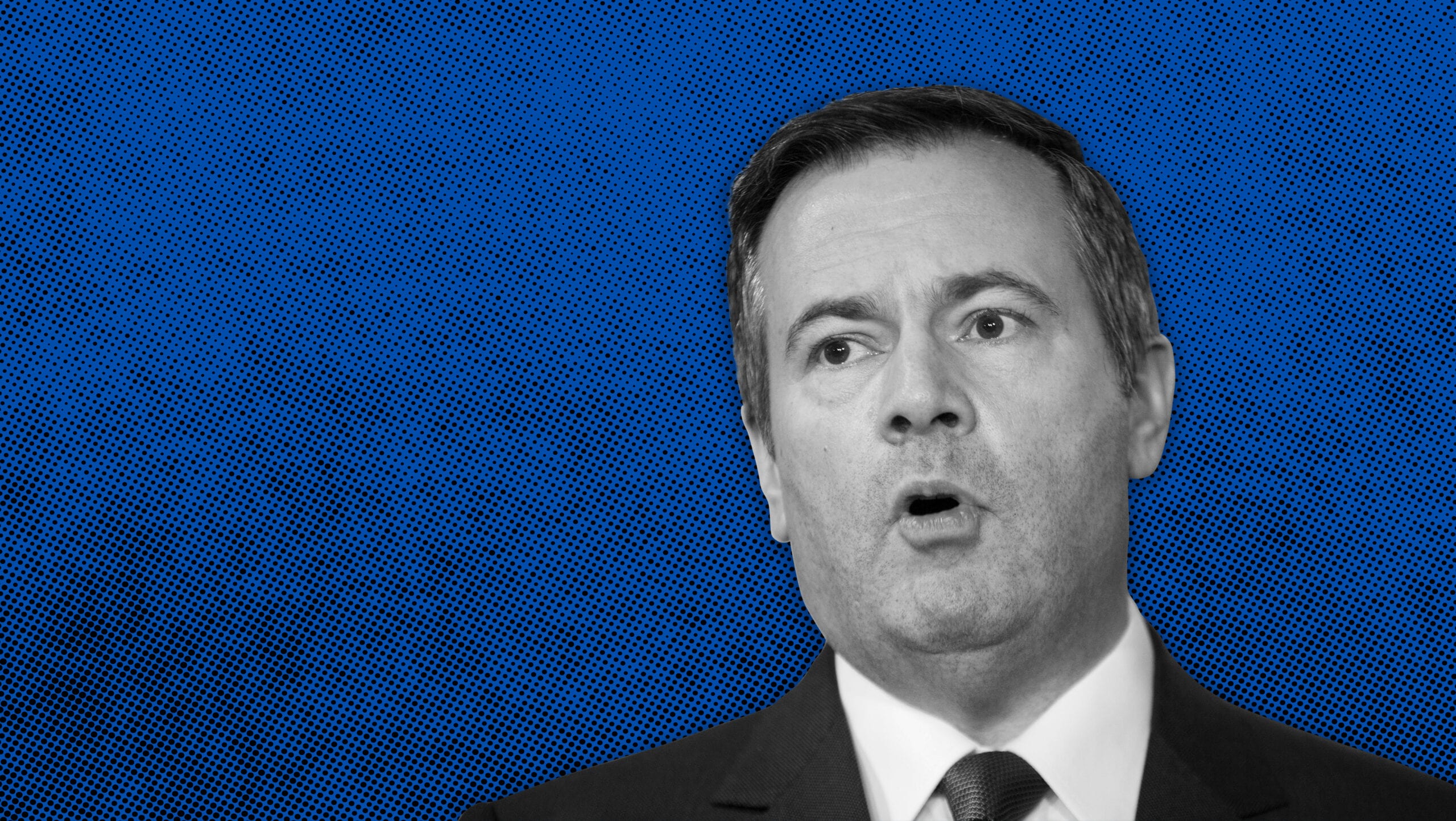On the night of April 16, 2019, Jason Kenney stood on stage in front of a crowd of conservative Albertans and took his time. Thirty minutes and 15 seconds, to be exact. Having just decisively won a majority government, the former Conservative cabinet minister’s speech—on the fight for Albertans’ rights, on the enduring strength of Alberta—ran long, his voice booming across the province and through the country. Jason Kenney, Alberta’s new premier, would be heard.
But as activists and progressives watched his victory speech, fears mounted that their voices might be silenced. A longtime federal politician who only recently jumped ship to provincial politics, Kenney has always had a terrible track record on LGBTQ2 issues.
And with Kenney as premier, the cascade of anti-queer problems came swiftly: Advocates spent two years fighting for students’ right to privacy in gay-straight alliances (GSAs) only for the legislation protecting students to be effectively killed once Kenney was elected. Meanwhile, a heated battle over the practice of conversion therapy in the province spurred rallies and pushback from groups on the right. Then, in June 2019, the Edmonton Pride Festival was cancelled as a result of disagreeing interests, leaving many without a safe place to celebrate the event held only once a year. All the while, rumblings of separation from the rest of the country—cheekily dubbed “Wexit”—reverberated through the province after the re-election of Liberal Prime Minister Justin Trudeau.
With Kenney’s United Conservative Party (UCP) in charge, the oft-misaligned Alberta is becoming the next battleground for queer rights in Canada. In a country that is seemingly moving forward—even the Conservative Party of Canada has stripped itself of its anti-gay leader—the province continues to fall behind. It seems the UCP is proof of the anti-gay and -trans power that remains at the helm in Canada.

Kenney’s anti-LGBTQ2 track record dates back to the beginning of his political career. He began his time in government in the late 1990s, when he was the MP for the riding of Calgary Southeast. In 2008, he became Minister of Citizenship, Immigration, and Multiculturalism under former prime minister Stephen Harper, and he spent the next seven years moving between different ministership roles before Harper’s 2015 defeat. Just two years later, Kenney became leader of the UCP and then, eventually, Alberta’s Leader of the Opposition.
But in the 1980s, before his time in Canadian politics, Kenney worked to make life difficult for queer people at the University of San Francisco while he was a student there. He protested when the school updated its policies to prohibit discrimination based on sexual orientation and fought to bar LGBTQ student groups on campus, beginning his reputation as an opponent of the community. Once he ran for Canadian office and was elected MP in 1997, Kenney voted against same-sex marriage, advocated against the addition of gender identity as a protected piece of the Canadian Human Rights Act and pushed for former Alberta premier Ralph Klein to use the notwithstanding clause to block rights for LGBTQ2 people.
In one of his more egregious actions, Kenney boasted to supporters during a 2000 speech that he helped repeal spousal rights legislation for same-sex couples, and that he pushed to have a law overturned giving gay men extended hospital visitation rights during the AIDS crisis. He also bragged about becoming president of his campus pro-life group, and that he overturned the first spousal law on the continent for same-sex couples.

Jason Kenney speaks to the media at his first convention as leader of the United Conservative Party in Red Deer, Alta., Sunday, May 6, 2018. Credit: The Canadian Press/Jeff McIntosh
As premier, Kenney and the UCP’s disregard for LGBTQ2 communities in Alberta has been no better illustrated than during the conversion therapy debate that gripped Edmonton in late 2019. While the capital city fought to end the abusive practice on a municipal level, Kenney’s government halted similar efforts at the provincial level. In early 2019, the NDP government under Rachel Notley introduced a working group to study how Manitoba and Ontario banned conversion therapy in order to draft similar legislation in Alberta. The group was disbanded almost immediately when Kenney came to power, with staffers citing that it was “not a valid health service” and wouldn’t be offered by an official healthcare provider.
“People thought conversion therapy didn’t happen anymore—even people on the left—but social conservatives were on it,” explains Glynnis Lieb, executive director of the Institute for Sexual Minority Studies and Services at the University of Alberta. “It wasn’t even on the radar of the NDP until [an advocate] brought it up.”
Other municipalities, including St. Albert, Strathcona County, Wood Buffalo and Spruce Grove, have also banned conversion therapy within regional limits. The same debate was started and settled in Calgary. But provincially, no legislation exists. The province seems content to let municipal governments tackle the issue without its intervention.
Early into his tenure as premier, Kenney similarly shut down the battle for protections among members of GSAs in Alberta schools. In 2017, Edmonton school board trustee Bridget Stirling penned a letter to Notley’s NDP government advocating for the protection of students’ privacy when they joined the supportive school groups. Bill 24 was introduced as a result, ensuring that school staff were prohibited from notifying parents and guardians that a student had joined a GSA.
“The consensus: People with intersecting identities will suffer most under Kenney’s policies”
Once Kenney’s UCP took over, however, that was quickly blocked. The government spent time managing education legislation that eventually did away with Bill 24 through a process of proclaiming old legislation that sat on the books for years and reinstating schools’ ability to call parents with information on the groups their children joined at school.
In November, a member of the UCP also introduced Bill 207. Powerfully nicknamed the “Abandoning Patients Act” by activists and opposition, the bill looks to grant “conscientious objection” rights to healthcare providers—allowing a doctor or other health professional to deny service and referrals to a patient based on any personal factor. The bill, LGBTQ2 activists argued, could allow for the denial of service to queer and trans patients, preventing them from receiving gender confirmation surgery or other vital services.
The Abortion Rights Coalition of Canada immediately introduced a petition to stop the bill. “It gives doctors the right to judge patients,” founder and director of the coalition, Joyce Arthur, says. “It legalizes discrimination.”
Arthur says the bill could also create barriers to abortion, disenfranchise low-income queer people and sex workers and allow refusal of service to the most vulnerable marginalized people.
“Gay-straight alliances, abortion, sexual health, sex education—it’s all connected,” she says. The consensus: People with intersecting identities will suffer most.

Despite enduring rally cries for the east to pay attention to it, Alberta is a powerhouse province. In fact, many of the issues it faces define federal elections and shape national party platforms. Take the country’s most recent federal election: Though Justin Trudeau’s Liberals won a minority government, the party lost all of its seats in Alberta, sparking national debates over the possible provincial separatism. This February, Premier Kenney stirred up threats against national unity yet again, suggesting that a rejection of a proposed oil sands project in Alberta would have “devastating impacts” that could exacerbate western alienation. Politico has even gone as far as describing Kenney as “Trudeau’s unofficial opposition.”
As the threat of Western separation and alienation gains legitimacy, the rest of Canada scoffs—such an ostentatious move is hard to take seriously. But to the progressives of Alberta, these threats are scary. The feelings leading to Wexit are real, and those on the right are looking to build an Alberta that stands opposed to progress. Who gets left behind under these threats—and a Kenney government?
“Who gets left behind under threats of Alberta separatism—and a Kenney government?”
It’s why queer and trans activists and allies hope they can make incremental change. The reality of a queer- and trans-unfriendly Alberta has become a call to arms for progressive activists; pro-choice groups, senior citizens, accessibility advocates, racialized communities and LGBTQ2 people have united to mobilize.
Both Lieb and Estefania Cortes-Vargas, former Alberta NDP MLA and executive director of the Pride Centre of Edmonton, say several groups that typically haven’t “gotten along” are now working together for common goals—most notably queer people of colour and “mainstream” (read: white) LGBTQ2 groups. “This year has been about how to reestablish more equitable relationships,” Lieb says.
“There are too many fronts to fight,” adds Cortes-Vargas. “We’re all in this together, and we have to find relationships so we can work this out.”
From marches for abortion rights to protests against anti-queer policies, those in the community are doing “all of this with no resources,” according to Cortes-Vargas. Students are staging walkouts in support of their queer peers. Community groups and organizations are hosting their own Pride events. Rallies are taking place across the province in support of abortion rights. Most significantly, countless of Kenney’s opponents have begun to use their voices.

“It was a hard year,” Bridget Stirling says, reflecting on 2019. “But something is shifting.”
It’s a cold start to 2020 in Alberta, but members of the LGBTQ2 communities in the province are warming up to the activism ahead of them. “I was initially feeling defeated,” Stirling says, “but not anymore.”
She thinks back to a few months ago, when the weather was slightly warmer and the fight for Bill 24 was still hot. On a Friday in May, thousands of students walked out of their classes to stand up for queer rights in education. This included an estimated 1,400 students from Catholic schools. In the face of punishment and consequence, the youth stood up and got loud. Stirling hopes the rest of the province will continue to do the same.
And so, Stirling says, LGBTQ2 Albertans trudge forward in this battle for queer rights. The rest of the country, if it can get over its hang-ups with the west, should be watching with anticipation what happens next—because it will determine who Albertans are.


 Why you can trust Xtra
Why you can trust Xtra


